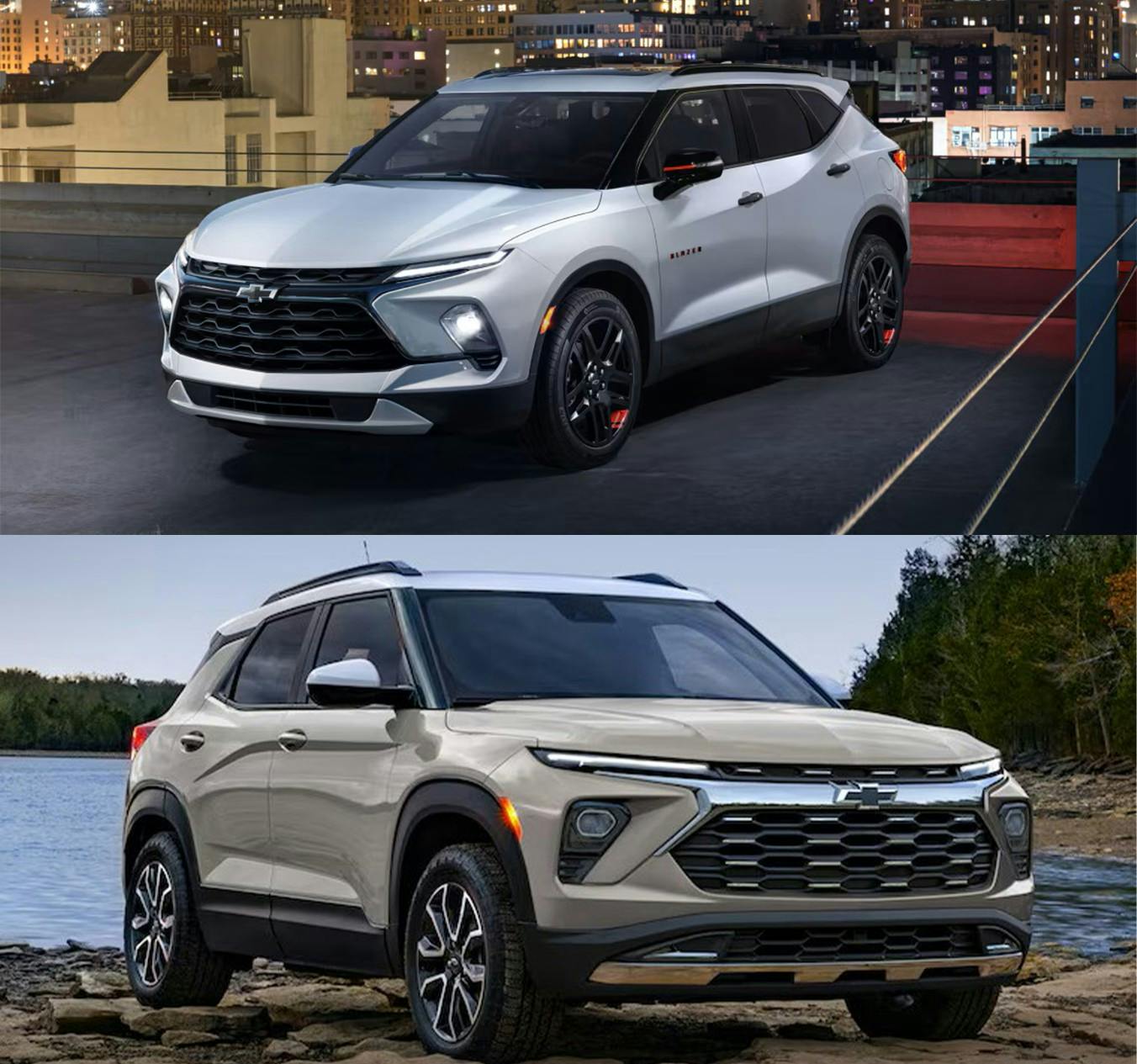
Chevy Blazer vs. Trailblazer: Which SUV Is Right For You?
If you’re looking at a new SUV from Chevrolet, two names that often show up in the conversation are the Chevrolet Trailblazer and the Chevrolet Blazer. The names are similar and the styling shares some cues, but in reality they’re aimed at very different kinds of buyers. In this blog‑style post, I’ll run through what each model brings to the table (size, performance, features, cost) and then help you figure out which one might be right for you.
Meet the Players
Chevrolet Trailblazer
The Trailblazer is the smaller, more compact crossover of the two. It’s positioned as a city‑friendly SUV or an affordable entry into the Chevrolet SUV lineup — think maneuverability, efficiency, and a modest price tag.
Key highlights:
- Starts at a significantly lower price point compared to the Blazer.
- Engine options are smaller: e.g., 1.2 L or 1.3 L turbocharged engines producing ~137 to 155 hp and ~162 to 174 lb‑ft of torque.
- Excellent for fuel economy: one estimate gives up to ~29‑33 mpg highway for the FWD with the 1.3L engine.
- Dimensions are compact: length in the ~174 inch range, width ~71 inches (varies by year) so easier to park, navigate tight urban streets.
- Cargo / interior space: respectable, but less than the Blazer. Example: ~25.3 cu ft behind second row, ~54.4 cu ft with seats folded (2024 numbers) for Trailblazer in one source.
- Towing capacity is modest. Several sources note the max capacity is far lower than the Blazer’s.
Chevrolet Blazer
The Blazer is the “bigger sibling” — a midsize crossover that delivers more performance, more space, and a more premium feel (and cost) than the Trailblazer.
Key highlights:
- Price starts higher than for the Trailblazer.
- Engine options significantly more robust: e.g., standard 2.0 L turbo 4‑cyl (~228 hp/258 lb‑ft) and optional 3.6 L V6 (~308 hp) in some trims.
- Larger dimensions: one source lists length ~191.8 inches, width ~76.7 inches.
- Cargo volume: e.g., up to ~30.5 cu ft behind second row, ~64.2 cu ft with seats folded in 2025 model.
- Towing capacity is much higher. For example a properly equipped Blazer can tow up to ~4,500 lbs in some situations.
- Because of the size and power, fuel economy is lower than the Trailblazer. For example, ~22/29 mpg city/highway or worse depending on engine/drive configuration.
Which One Is Right for You?
When you’re deciding between the Trailblazer and the Blazer, think about your real needs, budget, and lifestyle. Here are some guiding questions and scenarios.
Choose the Trailblazer if…
- Your budget is tighter and you want to keep purchase price, insurance, fuel costs down.
- You primarily drive in the city or suburbs: commuting, errands, parking tight spaces, shorter distances.
- You don’t need large towing capacity or to haul heavy loads (e.g., boat/trailer).
- You carry people and cargo, but maybe not often large items or bulk gear — you’re OK with moderate space.
- Fuel economy is relatively important for you.
- You want a sensible, all‑round crossover with decent features for the money.
Choose the Blazer if…
- You have more budget to spend (purchase + fuel + potentially insurance) and you want more capability.
- You drive longer distances, highway travel, maybe cross‑country, or you want more comfort on longer trips.
- You regularly carry more cargo or passengers and want the extra space/capacity.
- You might need to tow more (e.g., trailer, boat, larger equipment) or want more performance.
- You care about a more premium (or sporty) driving feel, stronger engine, more tech and features.
- You’re OK with a slightly larger vehicle (size, footprint) and associated costs.
Some Practical Scenarios
- If you’re a young professional living in a city, with occasional weekend trips, no heavy towing, and you prioritize low cost and efficiency → Trailblazer makes a lot of sense.
- If you’re a family of 4 who regularly takes road trips, carries gear (camping, sports, etc.), maybe has a boat/trailer, wants a sharper driving experience → Blazer is likely the better fit.
- If most of your driving is stop‑and‑go, parking garages, tight urban streets: the Trailblazer will feel less cumbersome.
- If you value comfort, space and power, and don’t mind paying more, the Blazer delivers more vehicle for the money (although at higher cost).
Final Thoughts
Neither vehicle is “wrong” — each is well suited for a different mission. The Trailblazer is the smart, efficient choice; the Blazer is the more robust, upscale choice. Human nature often drives us toward “bigger is better,” but that’s not always the optimal decision when you factor in cost of ownership, parking/urban use, fuel, and how you actually drive.
To summarize:
- Go Trailblazer if you want good everyday utility at a lower cost, efficient city/suburb driving, and modest needs.
- Go Blazer if you want more space, more power, more capability, and you’re willing to spend more and accommodate a larger vehicle in your lifestyle.








